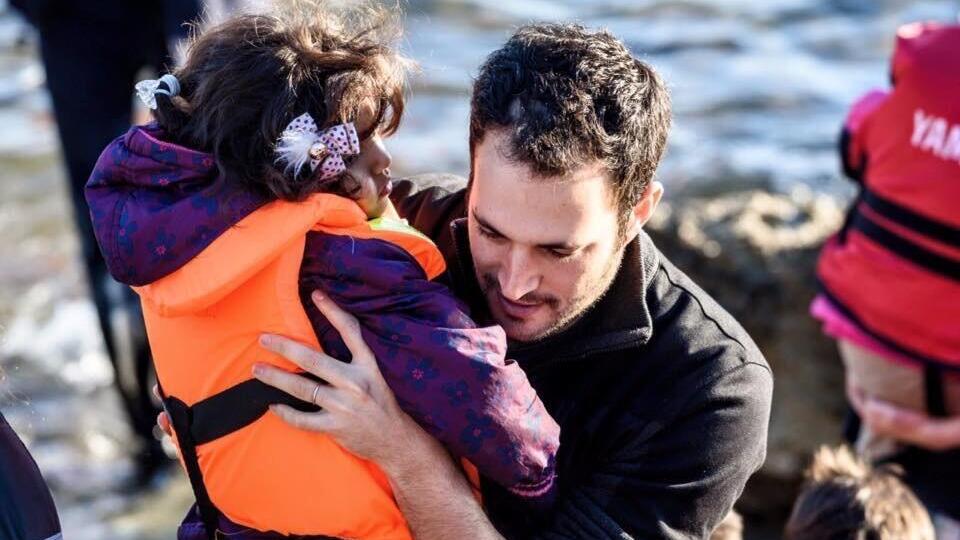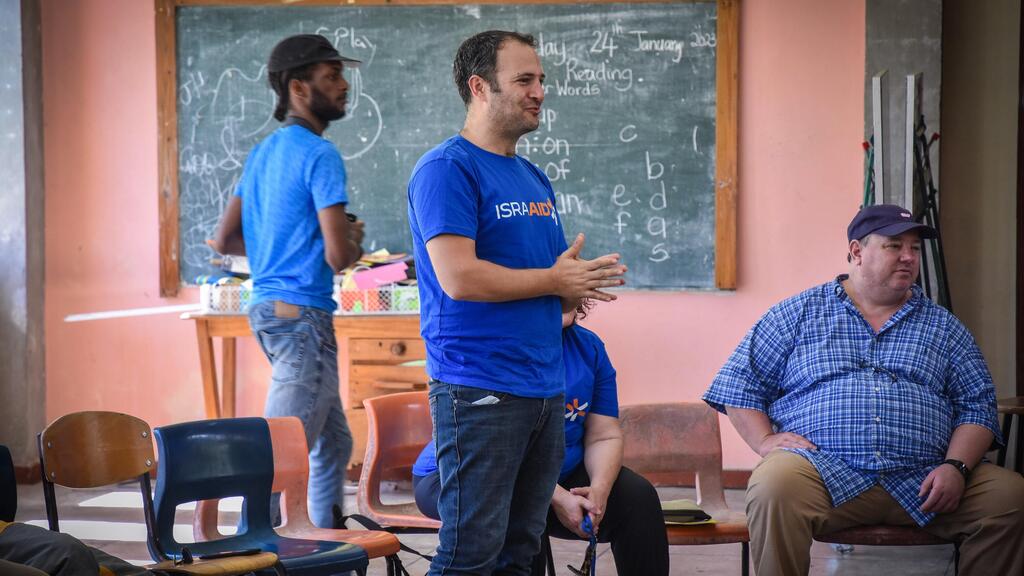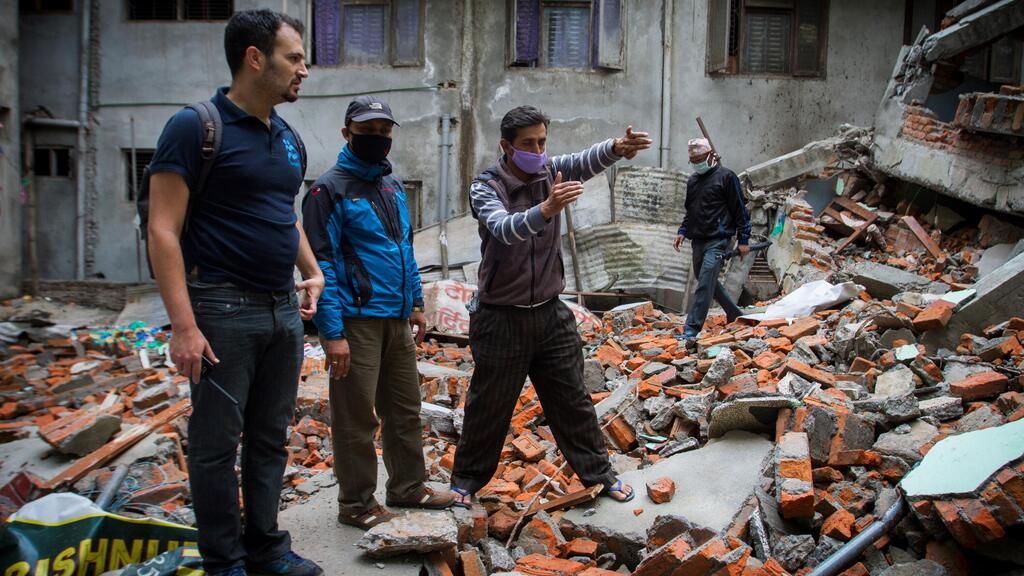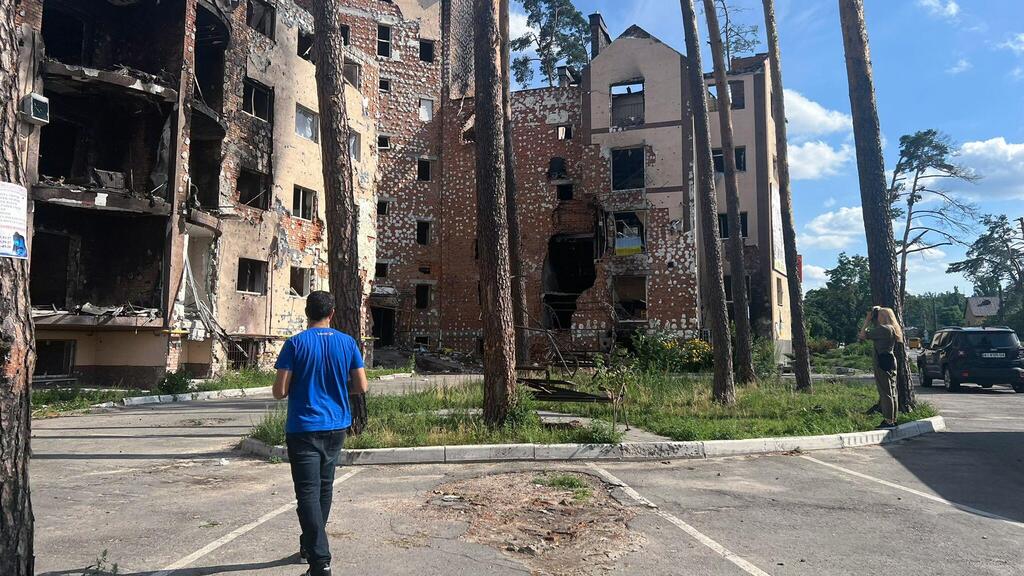
"Shachar Zahavi, who was at that time CEO of the humanitarian aid organization IsraAid, asked me to lead an aid mission there," he says.
"It was scary as hell. The death rate there reached 50%. They didn't even know how to identify exactly the symptoms of the plague, and whether it could be airborne. Each night I woke up drenched in sweat for fear that I had contracted ebola. Fortunately, I didn't.
We were there for almost nine months. I was already married, and my wife and I made a rule that once in a fortnight I would return from Sierra Leone in West Africa to Tokyo, where she lived. Every two weeks the Japanese would receive me in white uniforms and put me in quarantine at the airport."
Polizer, 40 years old, is currently the CEO of the IsraAid organization, and the ebola outbreak was not his first coping with disaster-stricken areas. The first encounter was after the tsunami that flooded Japan 12 years ago, resulting in the death of 20,000 people and about half a million people lost their homes.
"I came there with a delegation of volunteers from IsraAid, but the Japanese didn't want any help," he says. "From their point of view, receiving help from outside is a shame, a humiliation. We were already preparing to pack up our things and return home, but then we arrived at a kindergarten, where eight children were killed.
The Japanese government had already built a new kindergarten there, more beautiful than the previous one, but there was no one there to provide mental support to the children, to the kindergarten teachers, and to the parents, who suffered from post-trauma. Some of the adults blamed themselves for the loss and the great suffering caused by the tsunami.
We started an art therapy project there and the results were amazing. I stayed there for three years, and we trained more than 3,000 local social workers, teachers, and kindergarten teachers, so they could help themselves. That's also where I met my wife, Mayo."
What motivates a young man to suddenly volunteer and help in disaster-stricken areas?
"My father is a social worker and my mother is a special education teacher, but they didn't push me in that direction. I grew up in Mitzpe Harashim in the Galilee, it's a good place, where everyone volunteers and spends a year at a pre-army voluntary service.
What motivates me is that I have endless curiosity about people, cultures, and travels. When I see on the news the awful disasters in Turkey, Ukraine, or Japan, it's hard for me not to do anything.
Although we are not solving the global climate crisis or the refugee crisis, and we are not bringing about Putin's ouster - there is a desire to be there, to experience it with them, to get to know them, and to help. Also, my little brother, Ofer, an amazing man with cerebral palsy, sitting in a wheelchair, pushed me into this world of volunteering. He is a true inspiration to me.
"It also interests me how this work can change people's point of view, their perspective. This happened most strongly with the refugees who fled from Syria to Jordan and Greece. One day, in December 2018, inflatable boats that were supposed to carry a maximum of 20-30 people, arrived in Greece and according to my count carried 153 children, women, and old people in a boat. There were newborn babies there. And from all the people there - the first ones they saw were Israelis. They must have thought they got on the wrong boat."
Did they immediately realize that these were Israelis?
"Yes. The situation was also very chaotic. When a boat capsized in December 2015, we managed to save everyone. I was carrying a little, four or five-year-old, Syrian girl, who was really shaking in my hands. She suffered from severe hypothermia, and we managed to stabilize her condition.
Afghan ambassador's niece rescued by IsraAid
Her father told me then, 'My worst enemy became my best friend'. Then we also had a very dramatic rescue story in Afghanistan. We rescued two groups of women who were fleeing the Taliban. When the Afghan women found out we were Israelis, they were in shock. A positive shock.
"In Turkey, many of the buildings that were damaged could not be renovated, so they lived in tent camps that we purchased for them, together with generators. Not only did our team encounter no hostility there, but the contrary. The Israeli identity was well known. We received a lot of support and love from both the government and the local communities."
Nepal, where Polizer helped with the severe earthquake that hit the country in 2015, became his second home. "I went there for a trip after the military service, I lived for three and a half years in an amazing place in the Himalayas, and I worked helping street children," he says.
"While doing so, I began to help Israelis who were stuck in the Himalayas. Since then, I speak fluent Nepali. The rescue team pulled 21 bodies from the rubble of the earthquake. There was a woman there who survived six days. I thought that was the longest time one could survive under the rubble, but in Turkey, in the last earthquake, there was a woman who survived two weeks."
How did you learn to speak Japanese and Nepali?
"I just wanted to communicate with people. I couldn't bear the thought of having to work with a translator."
"It is important for us to stay even when everyone else leaves"
"We bring Israeli expertise to disaster areas, both in terms of trauma care and in technologies and medicine," says Polizer, who has been managing the IsraAid organization for the past few years. "When I joined the organization, its budget was less than a million dollars a year. Now it is more than $25 million. We have a department that is responsible for emergency plans as well as long-term plans.
"Why long-term plans? Because when there is a disaster, the whole world wants to come, donate, volunteer, send equipment. Everyone wants to help, but after a week or a month tops, when the stories are no longer 'starring' in the news broadcasts and on social networks - 90% of the help disappears, and everyone moves on to the next hot news item. In Turkey, 45,000 people were killed, and no one talks about it anymore. Ukraine is a continuing disaster, and now they hardly talk about it. That's how our world works, there's nothing we can do about it.
"That's why we need long-term plans. The rehabilitation in these areas - physical, mental, and economic - takes years. We arrive in the first 72 hours, immediately after the disaster strikes, but it's also important for us to stay after almost everyone else leaves because that's when the real work begins.
We plan to be in Ukraine for five years now. We have raised quite a large amount of money. We are also recruiting a local team alongside our people. We currently have more than 60 people there - water engineers, psychologists."
Where do you raise such large budgets from?
"Today we receive large amounts from entities such as the United Nations and the World Bank. Sixty-five percent of the budget comes from private donors in the United States, but also from donors in Israel. Our goal is for IsraAid to be known in the world such as they know the Red Cross and Doctors Without Borders.
Those who see us the most are the Jewish communities in the United States. For them, this is the Israel they would like to see - Israel that helps refugees. But due to the political complexity in Israel now, the situation with the Jewish communities is complicated."
IsraAid is currently investing quite a bit of resources in Ukraine and Turkey. "In Ukraine, we work quite closely with President Zelensky's wife," says Polizer. "She wrote a very touching post about us. For her, the most important goal is to help in treating trauma. She said that Israel, because of all our traumas, is the role model. We trained a group of 60 psychologists there, who work in hospitals and provide trauma assistance.
"I heard about a wounded man who lost all his friends. In a very long process, we were able to help him recover mentally. There was also an incident where a helicopter crashed into a kindergarten, and our team of psychologists immediately arrived and gave first aid.
Another touching story happened in the city of Mykolaiv, not far from Odessa, where the infrastructure was completely destroyed, and people had no drinking water. We brought water desalination systems there, and today we have 12 systems, which provide drinking water to 40,000 people."
Is it hard to deal with horrendous sights?
"The challenge is not to develop indifference. When you see a lot of dead people, you kind of get used to it. The body builds defenses for itself. It is very important that my defenses and those of the team are not too rigid, that we remember why we are doing this, and that we talk about it.
We work in South Sudan, for example. This is a country where, according to UN estimates, more than 60% of women have been raped. There is a severe civil war there, and rape is used as a tool of war. We established there centers for victims of sexual assault, which help them rehabilitate and find work afterward."
Polizer was recently informed of his winning the Charles Bronfman Prize, the most important award in the Jewish world today presented to humanitarians. "It is truly an honor," he says.
"Although the award is individual, I did not receive it because of me, but because of the team. The amazing thing about the team here is that they are people who get up every morning with tremendous motivation to help people in the most remote places in the world. I will donate a large part of the prize, which is $100,000, to the organization, and I hope we can leverage that to get other organizations to donate more."
What is your vision?
"The vision is to be in a hundred countries and with an annual budget of $200 million. To be a significant player in the world of humanitarian aid, and to bring significant added value, which other entities do not bring."








